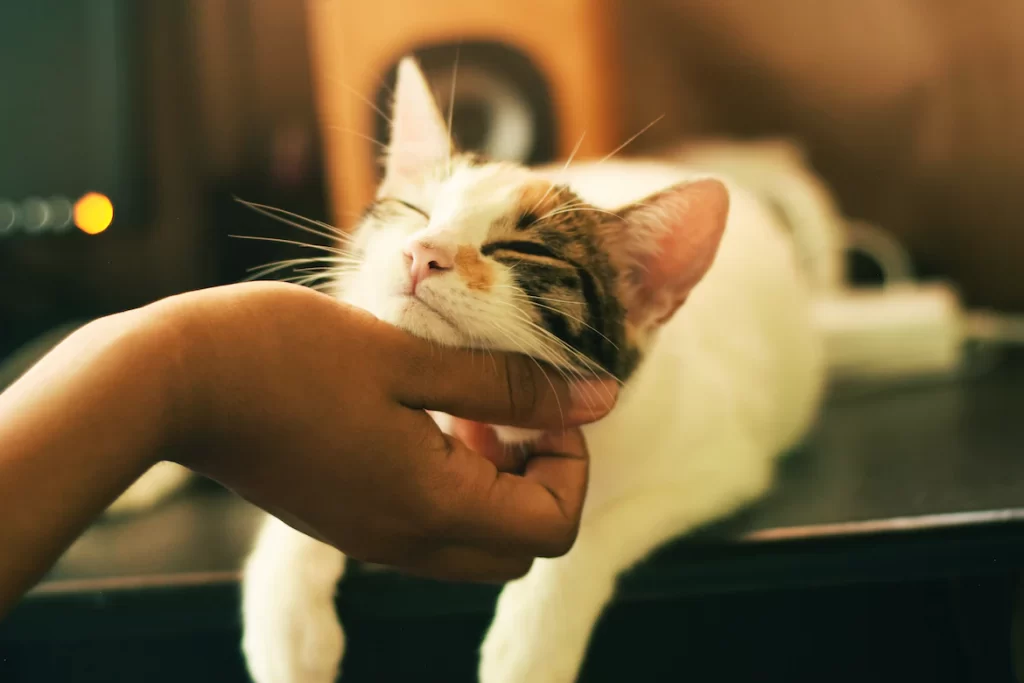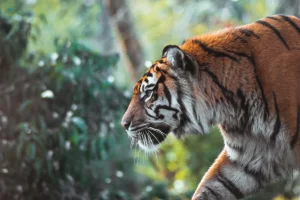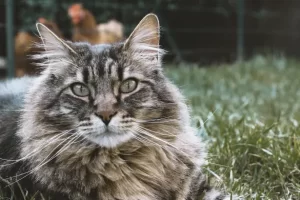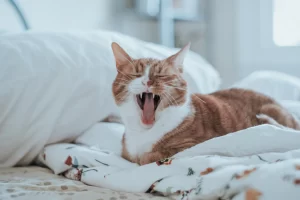Last updated on March 5th, 2023 at 01:10 am

‘Why is my cat squinting’ is a common question among cat owners. Please read this guide to find out about the potential causes and solutions.
Cats are loving and affectionate pets. Often, you will find them staring at you with their beautiful eyes wide open. Sometimes, they may give you a loving look. Other times, their starring may appear as if they are judging you.
Naturally, these pets have beautiful eyes. So, as a responsible pet owner, you need to take care of their eye health. How healthy their eyes are indicates their overall health. Thankfully, unlike dogs, cats don’t experience many eye problems.
One of the things you might notice with your cat’s eyes is squinting. Various issues can cause this. Squinting happens when your cat looks at you with half-closed eyes. It can happen in one or both eyes. Usually, it is not a concern as most healthy cats use this to inform one that they’re relaxed and feel safe around them. But too much of it can indicate a medical condition. If your cat is squinting, you may want to take him to a vet for a checkup. In the meantime, we will look at the various reasons your cat squints.
Why Is My Cat Squinting at Me?
Your cat may be squinting at you for a number of reasons. It could be a sign of pain or discomfort, an expression of affection, or a way to show dominance. It is important to pay attention to your cat’s behavior and make sure that it is not a sign of an underlying medical issue. One of the most common reasons for a cat to squint is that it has an eye infection. Eye infections can cause redness, discharge, and pain in your cat’s eyes. If you notice your cat squinting, it is best to take it to the vet for an examination to make sure that it has not contracted an eye infection. Your cat may also be squinting because it is in pain. Squinting is a sign of discomfort and can be caused by a variety of conditions, such as an ear infection, toothache, or other health problems. If your cat seems to be squinting in pain, it is best to take it to the vet for an examination.
Another common reason for your cat to squint is that it may be trying to focus on something. Cats have very good vision, and if your cat is squinting at something, it may be trying to get a better view of it. Besides, cat may also be squinting is that they are trying to show you affection. Cats often squint when they are relaxed and content, and it can be a sign of their love for you. It is important to remember that cats don’t always express their affection in the same way as humans.
Some experts argue that squinting reduces a cat’s vision by a huge percentage. So, if a cat does so, it may indicate that they have slowed down its guard and feel safe in the environment. Therefore, it is so important to take action to your when in this situation.
What Are the Common Health Issues Associated with Squinting?
Sometimes squinting can be due to a medical issue. If you notice that it is regular, happens on one eye, or other signs are accompanying it, it’s wise to consult with a vet. That said, here are some conditions that can cause squinting.
Blepharitis
Blepharitis is an inflammation of the eyelids that can cause pain and irritation in cats. When cats are in pain and discomfort they tend to squint or blink their eyes to try and reduce the irritation. The squinting is an attempt to protect the eye from further irritation or to reduce the amount of light entering the eye. The inflammation can be caused by allergies, bacterial or fungal infections, and other irritants such as shampoo or dust.
Blepharitis Symptoms:
- Mucus, watery or pus discharge from the affected eye
- Irritated eyes
- Hair loss
- Redness on the affected eye
- Inflammation of the eyelid’s margin, which increases the thickness
- Sensitivity to light
- Inflamed cornea
- Squinting or jerky blinking known as blepharospasm
Treatment for blepharitis may include prescription eye drops, oral medications, and/or warm compresses. Treating the underlying cause of the inflammation should also help reduce the squinting. In some cases, surgery may be needed to correct the condition. It is important to have your cat evaluated by a veterinarian if you notice any signs of squinting or irritation of the eyes.
Glaucoma
If you are asking, why is my cat squinting? Another reason could be glaucoma. Glaucoma in cats is rare but fatal when it occurs. It usually results from tumors, trauma, and infection. But at other times, it may be caused by a shift in the eye lens, a problem with the anatomy of the eye, which leads to pressure accumulation or an inflammatory disease.
Glaucoma needs immediate treatment. Otherwise, it can result in permanent eye loss and other eye problems that require long-term care. If your cat squints a lot, take him to the vet to rule out glaucoma.
Glaucoma Symptoms:
- Squinting
- Eye pain
- Cloudy cornea
- Red eyes
- Pressure on the eye, making it appear bigger than the other
- Dilation of the pupil
Glaucoma is treated in various ways. The vet can recommend beta blockers to help reduce humor generation, or they may recommend prostaglandin analogs like latanoprost to increase intraocular fluid in the eye. Other treatments that may be considered are steroids, cryosurgery, osmotic agents, and carbonic anhydrase inhibitors. The aim is to reduce inflammation while decreasing aqueous humor production.
Eye Injury
Injury to the eye can also be another potential cause of squinting. Punctures, scratches, or foreign material in the eye often cause it. Other times, it may result from blunt trauma to the eye. Symptoms include:
- Squinting
- Swelling
- Bright lights intolerance w
- Watery eye resulting from pawing
The production of tears can help remove the substance from the eye. But if the symptoms persist, take your pet to a vet to prevent further damage.
Uveitis
Uveitis is an inflammation of the uvea, which is the inner layer of the eye that is responsible for controlling the amount of light that enters the eye. In cats, uveitis can cause the pupil to become smaller and the eyelids to become inflamed. This can lead to squinting, which is the narrowing of the eyes in order to reduce the amount of light that enters the eye and reduce discomfort. In some cases, the inflammation can be so severe that the eye may become completely closed in an effort to protect the eye from further damage.
Uveitis Symptoms:
- Teary eyes
- Eye discharge
- Small or unequal pupil
- Swelling of the eyeball
- Inflammation which makes the eye softer
- Red or protruding eyelid
- Changes in the eye color
Treatment for uveitis typically includes anti-inflammatory medications, antibiotics, and topical treatments such as eye drops and ointments. Besides, vet usually aims to address the underlying condition, reduce pain and discomfort, minimize inflammation, and prevent further damage to the eye. Some of the approaches a vet may use include:
- Eye removal to remove the tumor.
- Steroids to treat diseases affecting the immune system
- Diabetes management which can include a change of diet
- Anti-viral drugs or antibiotics depending on the cause
- Anti-inflammatory treatment that can be given orally, topically, or sub-conjunctivally
Conjunctivitis
Conjunctivitis is an inflammation of the inner lining of the eyelid and the white part of the eye. Squinting is a common symptom of conjunctivitis in cats and is a result of the eye trying to protect itself from further irritation. The eye becomes swollen, red and tender and the cat may squint in an effort to stop the eye from being exposed to further irritation.
Conjunctivitis Symptoms:
- Eye discharge which may be watery with mucus/pus or thick and purulent
- Red and puffy conjunctiva
- Blinking
- Constant rubbing of the eye
- Pawing
- Eye ulcers if the cat has an FHV-1 infection
Treatment depends on the cause and severity. Your vet may recommend a saline solution to flush the eye in mild cases.
Dry Eye Syndrome
Dry Eye Syndrome (DES) is a condition caused by reduced tear production in cats. This can lead to a number of serious problems, including corneal ulceration and conjunctivitis. In addition, cats with DES may squint due to the irritation and discomfort caused by the dryness of the eyes. The squinting can help the cat protect itself from further irritation by blocking some of the light and air entering the eye. In addition, squinting can help the cat to reduce the amount of tears that are lost. If the squinting persists, it is important to take the cat to the veterinarian for a proper diagnosis and treatment.
- A lot of blinking
- Swollen eyelids
- Dry, dull, and opaque cornea
- Pain in the eyes
- Light sensitivity
Treatment for this condition typically consists of artificial tear drops, topical medications and occasional systemic medications. Artificial tears can help to lubricate the eye and reduce irritation. Topical medications, such as cyclosporine, can help to reduce inflammation and improve tear production. Systemic medications, such as antibiotics and steroids, may be used in more severe cases. It is important to keep the eyes clean to reduce infection and inflammation. If squinting persists, your veterinarian may recommend additional treatments such as a tear duct plug or a surgical procedure to increase tear production.
Corneal Ulceration
Corneal ulcers is also another cause of squinting. These are sores appearing on the eye’s transparent surface. They are usually caused by infections, injuries, lack of or insufficient production of tears, or structural abnormalities.
Symptoms:
- Eye irritation
- Excessive tear production
- Sensitivity to light
- Cloudy cornea
- Spasms of the eyelids
Treatment for corneal ulceration in cats typically involves the use of antibiotics and corticosteroids, which can reduce pain and inflammation and promote the healing process. It is also important to keep the eye clean and lubricated to avoid further irritation. In some cases, surgery may be necessary to repair the damage caused by the ulcer. In addition, the cat should be kept in a darkened area to reduce light exposure, which can further irritate the eye. Owners should also consult with a veterinary ophthalmologist to ensure that the treatment plan is appropriate and to monitor the cat’s progress.
When Should I Worry About Squinting?
As mentioned, squinting is a normal behavior in cats. But, if your feline squints and they’re struggling to open their eyes, a visit to the pet is necessary. Eye disease is a serious problem and should be addressed promptly. Otherwise, you risk vision loss and permanent blindness. If other symptoms accompany the squinting, it could be an eye disorder that needs to be checked. It is also important to be aware of the amount of time you spend squinting. Prolonged squinting can cause eye strain, which can lead to tired eyes, headaches, and difficulty focusing. Therefore, if you find yourself squinting for extended periods of time, it is important to take breaks.
Final Thoughts
Cat squinting is a very common behavior and can serve many purposes. In some cases, a cat may be squinting due to a medical condition such as an eye infection or injury. In these cases, it is important to seek veterinary care as soon as possible. In other cases, a cat may be squinting due to stress or anxiety. This can be caused by environmental changes, loud noises, or other environmental factors. It is important to identify the potential cause and provide a safe and secure environment for your cat. If you are concerned about your cat’s squinting, it is important to consult a veterinarian to make sure there are no underlying medical conditions. Additionally, providing a safe and secure environment can help reduce stress and anxiety, which can in turn reduce squinting.


